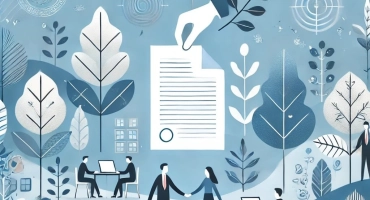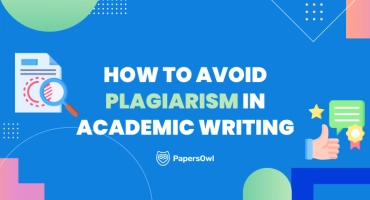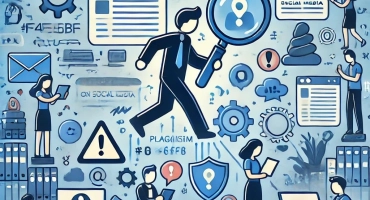Why is Plagiarism Bad?
Table of contents
Plagiarism in academic writing is a tough area to navigate, but why is plagiarism bad, and what are the consequences?
Plagiarism is bad because it is a form of dishonesty, stealing someone else’s work and presenting it as your own. This violates ethical principles and can lead to serious consequences, including academic penalties, legal issues, and damage to your reputation. Plagiarism undermines the value of original work and hinders personal development.
In academic writing, plagiarism is a risky practice that academic institutions do not tolerate. Guidelines on it are clearly outlined in student handbooks, and lecturers regularly warn against it. That’s why using a reliable plagiarism scanner before submission helps ensure your work stays original and avoids any issues.
10 Reasons Why Plagiarism Is Wrong
Unoriginal
Originality is a key requirement for any work, and copied content lacks value. While it’s acceptable to present the views of others (with proper citations), your own unique ideas and perspectives are expected as well.
Theft
Is plagiarism illegal? Plagiarism is a form of intellectual property theft and can be deemed illegal in certain circumstances. Although it may not seem as bad as physically stealing from someone, in the eyes of the law, it amounts to the same crime.
High Risk of Being Caught
In the past it was much easier to plagiarize, but with modern technology today, academic institutions can easily and thoroughly check work for plagiarized content (via a plagiarism checker, which generates a plagiarism score).
Although educational professionals may convince a student that the plagiarism percentage allowed is zero, the greatest amount of plagiarism that academic institutions commonly deem acceptable in submissions is around 15%.
Destroys Academic Integrity
Qualifications earned through plagiarism are unfair and fraudulent, which degrades the value of qualifications, undermines the effort of other students, and can be seen as fraud. Being honest, ethical, and thorough in your academic work is what academic integrity entails.
Destroys Trust and Reputation
Parents, guardians, teachers, and even peers may be disappointed in your behavior and not trust you in the future. You may find yourself being more closely monitored and questioned as regards your subsequent pieces of work and perhaps also during tests and examinations.
Unethical Act
Why is plagiarism wrong ethically? Plagiarized material is cheating and disrespectful. We all know it is morally not right. It may cause you stress being worried about getting caught, you may feel guilt, and even if you are successful in passing someone else’s work off as your own, you will not have succeeded in developing your skills or knowledge.
Compromises Learning Experience
By plagiarizing, you deny yourself the opportunity to engage with and learn from the material. This prevents you from developing important critical thinking and problem-solving skills.
Loss of Authenticity
Using someone else’s work creates a misleading image of your abilities. This hampers your growth both academically and professionally, as you are not showcasing your true potential.
Damages Creativity
Relying on plagiarism stifles your creativity. Instead of generating new ideas, you borrow from others, preventing yourself from contributing original thoughts and innovations to the field.
Affects Professional Integrity
Being caught plagiarizing can have long-lasting effects on your career. Employers value originality and honesty, and a plagiarism accusation can damage your professional reputation, making it harder to secure future opportunities.
Consequences of Plagiarism
There are varying consequences of plagiarism dependent on many factors of individual cases. For instance, submitting a complete paper written by someone else will have the most significant penalties, whereas citation errors made by accident are deemed less serious.
Some possible consequences are:
- Pressure to Produce Work of the Same Standard. If you manage to pass someone else’s work off as yours, then your educational instructor will be expecting a similar standard in the future, which you will not be able to do without risking plagiarizing again.
- Ruined Reputation. Your reputation at college may be tarnished, and you will not be trusted. You may find extra thorough checks being made on your future submissions.
- Embarrassment. Getting caught plagiarizing can be embarrassing and cause you unnecessary stress.
- Zero Grade. If caught plagiarizing, most educational establishments will only give a grade of zero. Still thinking, why is plagiarism bad?
- Lose Course Place or Qualification. It is possible for educational establishments to suspend or take you off the course completely. They can also refuse to issue a qualification due to plagiarizing. In some cases, they can revoke a qualification after it has been issued, but this is rare.
- Lawsuits. Stealing another person’s words or ideas can lead to court proceedings as current legislation clearly defines copyright law.
- Financial Penalties. You may be fined and ordered to pay compensation to the original writer.
- Loss of Employment. If your career relates to writing e.g., you are a journalist, you may lose your job, and your employer may make your plagiarism public knowledge which can make it difficult to obtain new employment.
How to Avoid Plagiarism
- Include Accurate Citations. Make sure you understand how to cite correctly and according to the style specified by your educational institution. Work can be cited in Harvard, APA, MLA, Chicago, Turabian, or another style, with different versions available, such as APA 6th and MLA 8th.
- Colour Code. Use a distinct color to highlight copied text. If you copy and paste material into a document to paraphrase or refer to later, use a distinct color (e.g., red) to highlight the text until you have put it in your own words and cited it. This will serve as a reminder that the content is duplicated. It’s easy to forget and include other people’s words into your work, especially when creating a huge piece.
- Proofread. Read your entire document from beginning to end to ensure that you have included in-text citations and a reference list entry for every piece of information you obtained from another source, as well as that any direct quotes are enclosed in speech marks.
- Use an Online Tool. A student may plagiarize intentionally or unintentionally. Students can be accused of plagiarism for incorrectly citing sources or failing to paraphrase effectively so, try using a free online plagiarism checker tool before submitting any work. This can provide you with an estimate plagiarism score and identity the duplicate content for you to edit.







